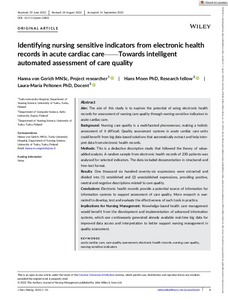Identifying nursing sensitive indicators from electronic health records in acute cardiac care―Towards intelligent automated assessment of care quality
von Gerich Hanna; Moen Hans; Peltonen Laura-Maria
https://urn.fi/URN:NBN:fi-fe2022112967836
Tiivistelmä
Aim: The aim of this study is to explore the potential of using electronic health records for assessment of nursing care quality through nursing-sensitive indicators in acute cardiac care.
Background: Nursing care quality is a multifaceted phenomenon, making a holistic assessment of it difficult. Quality assessment systems in acute cardiac care units could benefit from big data-based solutions that automatically extract and help interpret data from electronic health records.
Methods: This is a deductive descriptive study that followed the theory of value-added analysis. A random sample from electronic health records of 230 patients was analysed for selected indicators. The data included documentation in structured and free-text format.
Results: One thousand six hundred seventy-six expressions were extracted and divided into (1) established and (2) unestablished expressions, providing positive, neutral and negative descriptions related to care quality.
Conclusions: Electronic health records provide a potential source of information for information systems to support assessment of care quality. More research is warranted to develop, test and evaluate the effectiveness of such tools in practice. Implications for Nursing Management Knowledge-based health care management would benefit from the development and implementation of advanced information systems, which use continuously generated already available real-time big data for improved data access and interpretation to better support nursing management in quality assessment.
Kokoelmat
- Rinnakkaistallenteet [27094]
